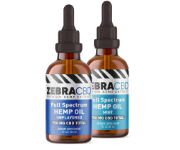
CBD can enhance your life in many ways, whether you’re looking for a mood-elevating accompaniment to your morning coffee, a relief from physical discomfort after sitting at your desk all day, or a soothing bedtime snack.
While CBD only contains trace amounts of THC — no more than 0.3% to be exact — you may still be wondering how long does CBD stay in your system?
While there’s no one-size-fits-all answer, CBD typically stays in your body anywhere between a few days to a few weeks. However, a variety of factors may impact how long CBD is detectable within your system, including the type of CBD you use and your body composition.
What Impacts How Long CBD Lasts in Your System?
Pinning down an exact number as to how long CBD lasts in your system is difficult because CBD’s longevity largely depends on its classification. On the market, there are three types of CBD available:
- Full-spectrum – Full spectrum CBD oil contains all of the naturally occurring compounds found in the cannabis plant, including trace amounts of THC. Some believe that this type of CBD oil is most effective. While full-spectrum CBD oil won’t get you high, it may show up on a drug screening. Additionally, a full-spectrum product may last longer in your body due to its potency.
- Broad-spectrum – Broad-spectrum CBD oil contains a mix of compounds from the cannabis plant, excluding THC. It’s perhaps not as potent as full-spectrum or CBD isolate, which may mean it stays in your body for a shorter amount of time. However, you can still get many potential benefits from incorporating broad-spectrum CBD products into your day-to-day.
- Isolate – CBD isolate is the purest form of CBD oil. It typically comes from hemp plants and contains onlyCBD. No other compounds are present. As you can imagine, the process of distilling pure CBD is lengthy, making this the most processed classification. If you want to avoid THC, this may be an ideal option for you.
Your body composition, your frequency of use and the amount of CBD you take may also impact its longevity within your system.
Body Composition
In addition to the type of CBD you use, you must also consider how your body responds to and metabolizes CBD. For that, consider the three “M’s” — metabolism, meals and make-up:
- Metabolism – Some people’s bodies process and distribute nutrients far more rapidly than others. Do you have a friend who can eat a lot more than you and never seems to stay full? A speedier metabolism doesn’t just impact how quickly one’s body uses food, it can also affect the length of time it takes for CBD to pass through your system. If you have a high amount of lean muscle mass, you may have a faster metabolism, which means CBD will exit your system more quickly.
- Meals – Depending on how you use CBD, the meals you consume before or after taking a CBD product can change the amount of time the CBD effect lingers. For example, larger meals take more time and energy to digest and can slow down the processing time for CBD. Thus, taking your CBD with a big meal may make it stay in your system for longer.
- Make-up – In addition to your body composition and metabolism, your overall health, the medications you take, and the frequency in which you exercise can all have an impact on how long CBD stays in your system.
Frequency of Use
How often you use CBD may also impact how long it stays in your body. That’s because the more you ingest, the more it will accumulate within your body.
Think of the CBD concentration in your body as snowfall — the more it snows, the higher the piles of snow in your yard grow.
If the existing snow doesn’t have an opportunity to melt before the next storm, the new snow will pile on top. Then when the sun finally emerges, it’ll take more time for those big mounds of snow to melt.
CBD may act in the same way.
If you use it frequently, it never has an opportunity to fully exit your system. The more you add, the longer it lingers. As such, if you use CBD every day, it may take a few weeks to leave your system after you discontinue use completely.
This isn’t necessarily a bad thing. In fact, if you’re looking to maintain long-term relief or relaxation, regular CBD use may ensure that you have a long-lasting CBD supply within your body. You can also reference our CBD gummy dosage guide and find out how often you should take CBD oil for further information.
Amount of CBD Used
The amount of CBD you use in each dose may influence how long it stays in your system. Think back to that earlier snow analogy — the more CBD you ingest, the longer it’ll take to leave.
However, if you’re new to CBD, it’s recommended that you start with small doses and work your way up to higher amounts as your body adjusts. Additionally, you should:
- Check for potential medication interactions
- Be patient as it can take time to feel like it’s working
How Is CBD Metabolized in Your Body?
CBD can be metabolized in your body in several different ways, including:
- Topically
- Through your digestive system
- Under your tongue
Depending on your preferred method of use, the process of metabolizing the CBD will be very quick orvery slow. For example, under-the-tongue and topical use will take effect more quickly than if you consumed the CBD orally. That’s because a full-spectrum CBD gummy has to travel through your digestive system before it enters your bloodstream.
Can CBD help boost metabolism? While incorporating sleep, healthy exercise, and eating habits into your daily life can aid your metabolic function, CBD may also support your wellness.
How Long Will You Feel the Effects of CBD?
The amount of time you feel the effects of CBD is another one of those queries to which there isn’t a set answer. The same factors that contribute to the length of time it takes for CBD to clear your system also impact how long you’ll feel the effects.
On average, you might expect to reap the benefits of your CBD products for anywhere between 2 to 6 hours.
A Deep Dive into the Types of CBD Products
As touched on earlier, the type of CBD you use also changes how long it remains in your system and how long it will take to feel the effects of the CBD product you used. There are several ways to take CBD, the most common of which are:
- Topical CBD lotions or rubs
- CBD edibles
- CBD oils
Let’s examine how each of these changes the timeline of CBD’s effects and longevity.
Topical CBD Products
Topical CBD products are creams or lotions that you apply to your skin. They don’t actually enter your bloodstream at all. Instead, the CBD in these products interacts with the CB1 receptors on your skin. People often use topical CBD products to:
- Help with stiff joints from exercise
- Provide relief from exercise-induced muscle discomfort
Because you simply rub topical CBD onto your skin, very little is absorbed into your body. This means it’s not likely that the CBD from these applications is detectable for a lengthy period of time.
CBD Edibles
Understanding CBD education and how long CBD edibles remain in your system is more complex. Before it can enter your bloodstream and begin to take effect, CBD has to pass through your digestive system. This involves several steps as it moves through the digestive tract, stomach and liver before it enters your bloodstream and travels to other parts of your body.
This can mean several things for you, including:
- CBD absorption can take several hours to feel the effects
- The speed at which your body’s metabolism moves will determine how long it takes
- Once the CBD has gone through this process, less remains
- Less remaining CBD means it might exit the human body completely in less time
Your metabolic rate and the amount of food in your stomach at the time you consume the CBD may also change the time frame of how long the product lingers.
CBD Oils and Tinctures
The most direct route CBD products can take into your bloodstream is sublingually, or under your tongue. CBD oils and tinctures are typically sold in a small bottle with an eyedropper. You use the dropper to place the CBD drops directly under your tongue.
When you let the drops sit under your tongue before you swallow, the CBD is absorbed by the mucus membranes in your mouth. This allows the CBD to skip that lengthy digestive process and get right to work. You’re likely to feel the effects more rapidly and, because you don’t lose as much CBD during the digestion process, it may remain in your system longer.
Are There Different Testing Methods for CBD?
If you’re curious about how long CBD remains in your system, it’s important to know that there are different methods of testing for CBD. Each testing method can result in a different time frame for detection. Some common CBD testing methods might include:
- Blood test
- Saliva
- Urinalysis
- Hair testing
Of these testing methods, the presence of CBD might be detectable longest in your hair. That being said, most drug tests don’t screen for CBD since its use is currently allowed in all 50 states.
Can You Fail a Drug Test Due to CBD?
The only time you might need to be concerned about CBD triggering a positive result on a drug test is if the test is screening for THC. Full-spectrum CBD oil does contain trace amounts of THC so it’s possible that CBD could trigger a positive test.
If you’re very concerned about a potentially positive drug test, simply skip the full-spectrum CBD and opt for broad-spectrum or CBD isolate instead. Also, alwaysmake sure you only purchase CBD products from a source that you trust. This will help ensure that you’re getting exactly what the label claims is in the bottle.
Zebra: Your Trusted CBD Expert
No one knows for sure how long it takes CBD to exit your system. The estimated timeline is somewhere between 2 days to 2 weeks. Your body composition, the type of CBD you use, and how you use it all influence how rapidly it exits your body.
If you’re feeling a little overwhelmed with information about CBD, your trusted CBD experts are here to help. Here at Zeba CBD, we offer high-quality CBD products across the board and a Label Accuracy Guarantee, meaning you can shop with confidence knowing you’re getting exactly what’s on the label.
Check out our offerings today.
Sources:
Discover. How Long Does CBD Stay in Your System? https://www.discovermagazine.com/health/how-long-does-cbd-stay-in-your-system
British Journal of Clinical Pharmacology. The Pharmacokinetics and the Pharmacodynamics of Cannabinoids. https://bpspubs.onlinelibrary.wiley.com/doi/10.1111/bcp.13710
Pharmaceuticals. Towards Better Delivery of CBD. https://www.mdpi.com/1424-8247/13/9/219/htm
Therapeutic Drug Monitoring. Detection Times of Drugs of Abuse in Blood, Urine, and Oral Fluid. https://journals.lww.com/drug-monitoring/Abstract/2004/04000/Detection_Times_of_Drugs_of_Abuse_in_Blood,_Urine,.20.aspx










